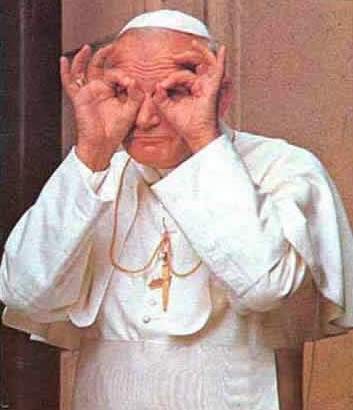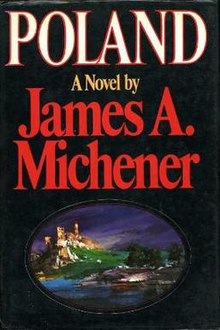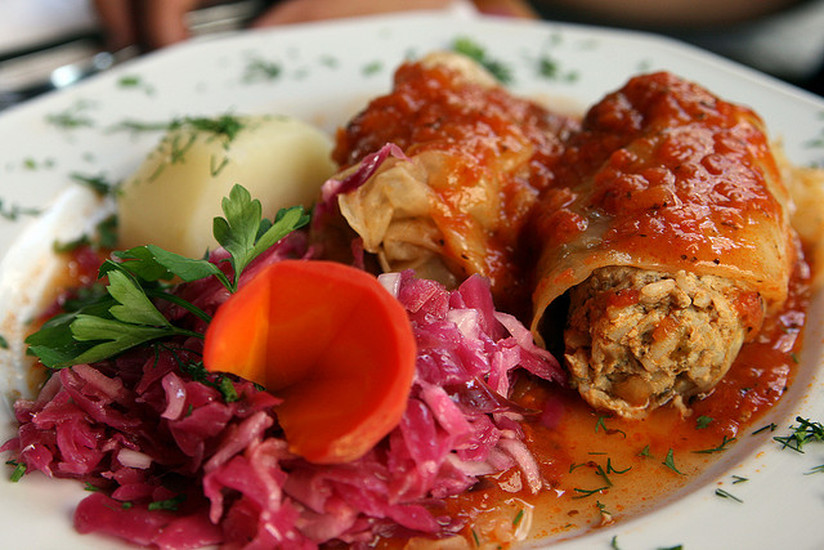I am a big fan of
James Michener’s novels. For those who don’t know his works, he writes epic
novels that typically tell the history of a place, using the place as the
central character in many cases. His style is more or less a mix of fictional
characters and situations in the midst of actual historical characters and
situations. So far, I’ve read Alaska,
Covenant (about South Africa), Iberia,
Mexico, Texas, and This Noble Land.
My mom introduced me to him years ago and had read Poland not too long ago, and several months ago I found a copy of Poland at a used bookstore, but I
haven’t had the chance to start it yet (thanks to the Outlander series and the hundreds of books I have on my shelf).
The name Poland is
named from the 8th century tribe of people called Polans. Also known
as Polanie, it’s based on a Slavic word meaning “field.” However, in many
languages, the name for Poland is a variation of Lechites, after the legendary
leader of the Polans, Lech I.
The country of Poland
is located in north-central Europe. It is bordered by the Baltic Sea to the
north, the Russian exclave of Kaliningrad to the north, Lithuania to the
northeast, Belarus to the east, Ukraine to the southeast, Slovakia to the
south, Czechia to the southwest [the new name of Czech Republic], and Germany
to the west. Poland is known for its numerous lakes and the southern part of
the country is highly mountainous.
The earliest known
peoples in this area were many distinct groups of Slavic people. In the years
around 1000AD, many of these Slavic tribes began converting to Christianity and
began to unite as one people. During the first few centuries after this, they
went through many changes in government, religion, rulers, relationships with
other countries, and military. The first university charter (University of
Kraków) was established, and Poland luckily was mostly spared from the Black
Death that ravaged much of Europe. Poland was largely a feudal state during the
Middle Ages, and afterwards saw a Renaissance, including Nicolaus Copernicus’
theory that the sun was the center of the universe, not the earth. The
Polish-Lithuanian Commonwealth was formed and took up quite a bit of Eastern
Europe. They fought several conflicts with the Russians, the Ottoman Empire,
and the Swedes. The 18th and 19th centuries saw many
uprisings and conflicts that led to losses/gains in territory as well as
changes in the government. Poland gained its independence again after WWI, but
only to find itself in a war with Russia (again). Nazi Germany invaded Poland
in 1939, followed by Russia a couple weeks later. Poland suffered
insurmountable devastation and death: nearly 1/5 of Poland’s population died
during the war, and half of those were Polish Jews. After WWII, the Soviets
still occupied Poland and turned it into a communist state. Although it was one
of the more lenient communist countries, it remained so until 1989. Poland has
made great strides economically and politically as it transitioned to a
democratic nation during the 1990s and 2000s.
With about 3.1
million people, Warsaw is Poland’s capital and largest city. This city was
founded in 1323 on the banks of the Vistula River. Prior to WWII, it was
considered one of the most beautiful cities in the world, that is, until the
Nazis came in and destroyed most of it. By the end of the war, over 85% of the
city’s buildings were destroyed and were rebuilt in the years and decades that
followed. Today, it’s a major tourist destination and serves as an economic,
cultural, media, governmental center – it also has the largest number of
skyscrapers in the EU. But hey, does size really matter anyway?
 |
| Copernicus Science Center, Warsaw |
After the fall of
communism, Poland’s economy gained momentum as one of the fasted growing
economies in the EU. It transitioned to a market-based economy and encouraged
the privatization of businesses that were once state-owned. They have several
strong agricultural exports as well as a number of other manufacturing-based
products. Poland has established itself as a center for scientific research and
development, and many international companies have set up R&D centers here.
Poland also ranks high for tourism between its modern cities on the backdrop of
beautiful scenery.
 |
| Pope John Paul II |
Although Poland is
primarily Christian (and Roman Catholic at that), it was also the only country
in Europe—back in 1264—that granted
legal rights to Jews living there. Several other groups have settled in Poland
over the years after having struggles in their own countries: Calvinists,
Anabaptists, and atheists. Actually up until WWII, it was one of the more
religiously tolerant areas of Europe. Things changed after the war. It’s still
considered one of the most devout countries in Europe. And with 87% of the
population as Catholic, the Catholic Church has only had one Polish Pope: Pope
John Paul II.
| Sign in Polish and Belarusian |
The official
language is Polish, part of the Slavic family of languages. I read on a very
questionable article a few years ago that listed which languages are hardest to
learn for English-speakers, and Polish was listed as the number-one hardest
language. And without studying it, I agree. It just LOOKS hard. If Polish were
a meme, it would say, “You think German had too many consonants next to each
other? Hold my beer.” Anyway, they also granted an ethnic minority status to
several languages: Kashubian, German, Belarusian, Ukrainian, Russian, Rusyn,
Czech, Slovak, and Yiddish.
I realize after
mentioning that I’m looking for Polish recipes how large of a Polish population
there is in the US. I regret that when we lived in Chicago, we never made it to
the Polish section of the city to eat. Maybe this fall or winter, we can take a
trip back up there to check it out. However, I was amazed that several people
offered up recipes that are popular in their half-Polish or part-Polish
families. Many of these seem vaguely family to my part-German family, so I know
it’s gonna be fantastic. But if I make everything that sounds good, I’d never
get to the end of this blog.
Up next: art and
literature





No comments:
Post a Comment